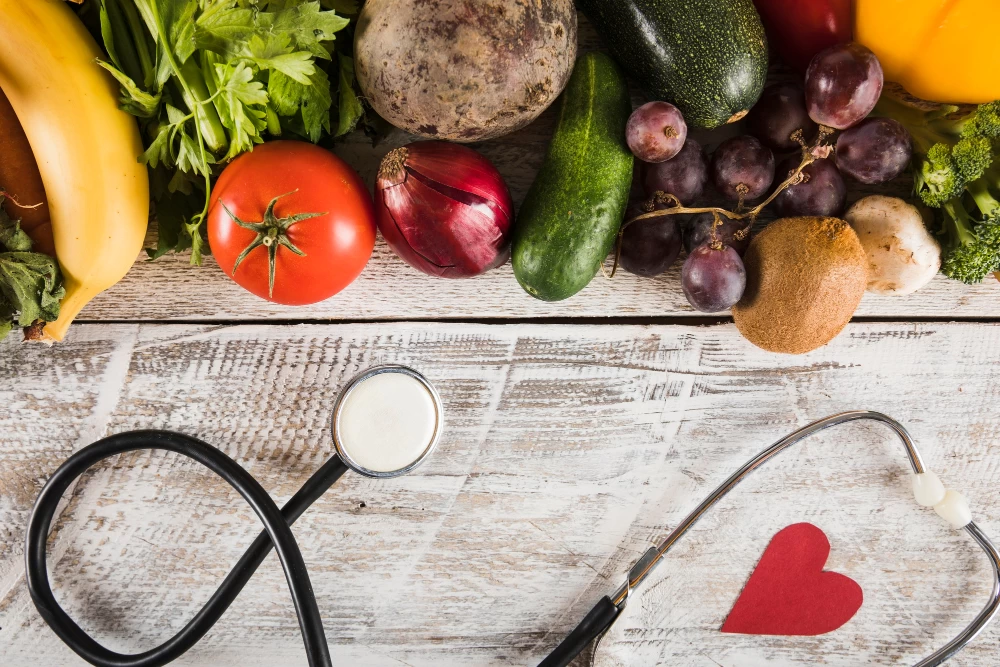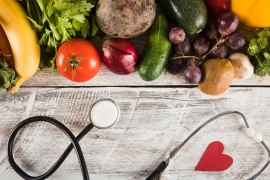
High Cholesterol and Nutrition
- High Cholesterol and Nutrition
- What is cholesterol?
- Am I at Risk?
- What Are High Cholesterol Values?
- How should a diet with high cholesterol be?
What is cholesterol?
Cholesterol is a sterol synthesized by animal cells and is also a component of the diet found in animal foods. Its main function is to maintain the integrity and fluidity of cell membranes and act as a precursor for the synthesis of substances vital to the organism, such as steroid hormones, bile acids and vitamin D. Our body can produce the cholesterol it needs on its own. However, we can get more cholesterol than our body needs due to the uncontrolled consumption of animal foods. When cholesterol is above the normal level in the blood, it sticks to the inner parts of the arteries with a waxy buildup called plaque, thus causing the vessels to narrow and harden.
However, elevated cholesterol is not always something we consider dangerous. This is because cholesterol is classified as good or bad cholesterol:
- High-density lipoprotein, or HDL, often called good cholesterol, helps remove excess cholesterol from your body.
- LDL, called low-density lipoprotein or bad cholesterol, causes plaque buildup in the vessels.
Another item included in lipid laboratory tests is triglyceride levels. Triglycerides are a specific type of fat in the blood. High triglycerides can be a sign that you have excess body fat or an increased risk of Type 2 diabetes. They can also be a sign that you're consuming too much, especially from refined grains or foods and drinks that contain added sugar. Triglycerides may also be elevated in people who smoke or drink too much alcohol.
Am I at Risk?
Many things can increase your risk of high cholesterol, including:
- Genetics: There is a genetic form of high cholesterol called familial hypercholesterolemia, which is passed from parent to child.
- Age: As we get older, our cholesterol level rises.
- Medications: Some medications can raise cholesterol levels.
- Obesity: Individuals with overweight or obese body mass indexes are at greater risk for high cholesterol.
- Diet: Consuming large amounts of saturated and trans fats can raise LDL cholesterol levels.
- Inactivity: Physical Activity helps raise HDL cholesterol.
- Smoking: Tobacco products reduce HDL and increase LDL.
What Are High Cholesterol Values?
In a healthy adult 20 years of age or older, a normal cholesterol level is generally considered to be 200 mg/dL. However, cholesterol results above this level are generally considered risky. LDL level, known as bad cholesterol, is generally expected to be below 130 mg/dL. Benign cholesterol (HDL) is 50 mg/dl in women; 55 mg/dl in men are considered normal values. A serum TG (Triglyceride) level below 150 mg/dl is considered normal.
How should a diet with high cholesterol be?
- Consume from Foods Containing Plant Sterols and Stanols: Vegetable oils such as corn oil, olive oil, soybean oil, oil seeds such as hazelnuts, walnuts, almonds, cereals, legumes, vegetables and fruits naturally contain plant sterols. Studies have revealed that there are more than 200 types of sterols. Consumption of foods rich in sterols has a cholesterol-lowering effect.
- Limit Your Saturated Fat Intake: Saturated fats are mostly found in animal foods such as meat and full-fat dairy products. Higher saturated fat intake has been found to raise LDL cholesterol. Studies have also shown that replacing sources of saturated fat with unsaturated fats can help lower your total and LDL cholesterol levels. To help reduce your saturated fat intake:
- Include vegetable oils such as avocado, hazelnut and canola, olive and peanut oil in your diet.
- Eat foods rich in omega-3 fatty acids, such as salmon, walnuts, and ground flaxseed.
- Choose low-fat or nonfat dairy products, such as 1%, or low-fat cheeses such as skim milk and nonfat yogurt, or reduced-fat feta and part-skim mozzarella.
- Avoid trans fats, they raise LDL levels and are found in highly processed foods. Check the amount of trans fat on the nutritional value label and ingredient list of packaged foods.
- Eat fish rich in omega-3 fatty acids: These acids are not capable of reducing LDL cholesterol levels, but they can help increase HDL cholesterol levels. In addition, they may help protect heart health against risk factors such as blood clots and inflammation, thereby reducing your risk of heart attack. Oily fish such as mackerel, tuna, salmon, sardines and lake trout contain omega-3s.
- Eat plenty of soluble fiber: Dietary fiber is found in fruits, vegetables, beans, lentils and whole grains. These nutrient-dense foods provide two types of fiber, soluble and insoluble. Both types are important for health. Getting enough dietary fiber from a variety of foods is important for everyone.
Research has shown that soluble fiber, especially from fruits, vegetables, beans, lentils, and whole grains, can help lower LDL cholesterol. In the stomach, soluble fiber forms a thick, jelly-like substance that helps bind dietary cholesterol from the foods you eat.
- Eat a variety of fruits and vegetables of different colors.
- Switch to more plant-based or vegetarian meals by incorporating foods such as beans, kidney beans, chickpeas, lentils, and soy in your diet.
- Make sure the food label on your bread is 100% whole grain or says it has whole grain as one of the first ingredients.
- Limit refined carbohydrates, especially sources of added sugars such as desserts and sugar-sweetened beverages.
In addition to the ones mentioned above, we can talk about the positive effects of creating a nutrition plan specific to individuals with high cholesterol and losing weight separately on cholesterol. You can talk to Specialist Dietitian Tuğba Gülay in detail about high cholesterol, whether online or face to face, and get personalized diet service.





